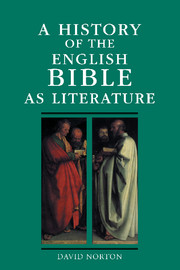Book contents
- Frontmatter
- Contents
- List of plates
- Preface
- List of abbreviations
- 1 Creators of English
- 2 From the Great Bible to the Rheims-Douai Bible: arguments about language
- 3 The King James Bible
- 4 Literary implications of Bible presentation
- 5 The struggle for acceptance
- 6 The Psalter in verse and poetry
- 7 ‘The eloquentest books in the world’
- 8 Writers and the Bible 1: Milton and Bunyan
- 9 The early eighteenth century and the King James Bible
- 10 Mid-century
- 11 The critical rise of the King James Bible
- 12 Writers and the Bible 2: the Romantics
- 13 Literary discussion to mid-Victorian times
- 14 The Revised Version
- 15 ‘The Bible as literature’
- 16 The later reputation of the King James Bible
- 17 The New English Bible
- Bibliography
- General Index
- Biblical Index
10 - Mid-century
Published online by Cambridge University Press: 05 June 2012
- Frontmatter
- Contents
- List of plates
- Preface
- List of abbreviations
- 1 Creators of English
- 2 From the Great Bible to the Rheims-Douai Bible: arguments about language
- 3 The King James Bible
- 4 Literary implications of Bible presentation
- 5 The struggle for acceptance
- 6 The Psalter in verse and poetry
- 7 ‘The eloquentest books in the world’
- 8 Writers and the Bible 1: Milton and Bunyan
- 9 The early eighteenth century and the King James Bible
- 10 Mid-century
- 11 The critical rise of the King James Bible
- 12 Writers and the Bible 2: the Romantics
- 13 Literary discussion to mid-Victorian times
- 14 The Revised Version
- 15 ‘The Bible as literature’
- 16 The later reputation of the King James Bible
- 17 The New English Bible
- Bibliography
- General Index
- Biblical Index
Summary
ROBERT LOWTH'S DE SACRA POESI HEBRAEORUM
Several French critics were moving towards understanding of the form of Hebrew poetry from observation of its characteristics but without reference to known standards. The Cistercian Abbot Claude Fleury observes that the poetry ‘abounds with repetitions, and the same thoughts are expressed twice over in different terms … these repetitions are the most obvious and common mark of the poetic style’. The Benedictine Dom Augustin Calmet, believing ‘that the art of versifying alone no more makes the poet than the numbers and measures make the poetry’, builds a little on this. In terms that could fit the KJB, he argues that
this natural poetry … consisted altogether in the style and not at all in the measure of the syllables. The whole was nothing else but figurative, sublime and sententious expressions, wherein they generally affected a kind of repetition of the same thing in different terms in the two parts of the same sentence, and sometimes we find a sort of rhyme and cadence which are so obvious and remarkable that we need not be at much pains to discover them.
Just what he means by ‘a sort of rhyme and cadence’ is left unspecified: the very vagueness opens a possibility that was developed later, that there could be a kind of rhyming of sense rather than sound.
Neither man goes further than what has been quoted: the point is not stressed but the seed is sown. Several Englishmen at this time took note of the repetitions.
- Type
- Chapter
- Information
- A History of the English Bible as Literature , pp. 218 - 241Publisher: Cambridge University PressPrint publication year: 2000



